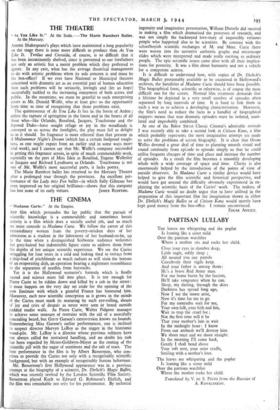THE THEATRE
AMONG Shakespeare's plays which have maintained a long popularity on the stage there is none more difficult to produce than As You Like It. Troilus and Cressida, of course, is so difficult that it has been incontinently shelved, since it presented to our forefathers not only an artistic but a moral problem which they preferred to ignore. In any case, what has the average theatrical management to do with artistic problems when its sole concern is and must be the box-office? If we ever have National or Municipal theatres concerned with dramatic art as an essential part of human education then such problems will be seriously, lovingly and (let us hope) successfully tackled to the increasing enjoyment of both actors and public. In the meantime, we must be grateful to such enterprising actors as Mr. Donald Wolfit, who at least give us the opportunity from time to time of recognising that these problems exist.
The quintessence of As You Like It lies in the forest of Arden ; unless the rapture of springtime in the forest and in the hearts of all those who—like Orlando, Rosalind, Jacques, Touchstone and the deposed Duke—have sought refuge or joy in the woodlands is conveyed to us across the footlights, the play must fail to delight us as it should. Its fragrance is more ethereal than that present in A Midsummer Night's Dream (which has a certain foolproof tough- ness, as one might expect from an earlier and in some ways more vital work), and I cannot say that Mr. Wolfies company succeeded in getting this fragrance across, in spite of much commendable work, especially on the part of Miss Iden as Rosalind, Eugene Wellesley as Jacques and Richard Lyndhurst as Orlando. Touchstone is not one of Mr. Wolfit's most successful parts, it lacks poetry.
The Marie Rambert ballet has returned to the Mercury Theatre after a prolonged tour through the provinces. An excellent per- formance of the Lady into Fox ballet—in which Sally Gilmour has even improved on her original brilliance—shows that this company
has lost none of its early virtues. JAMES REDFERN.


























 Previous page
Previous page